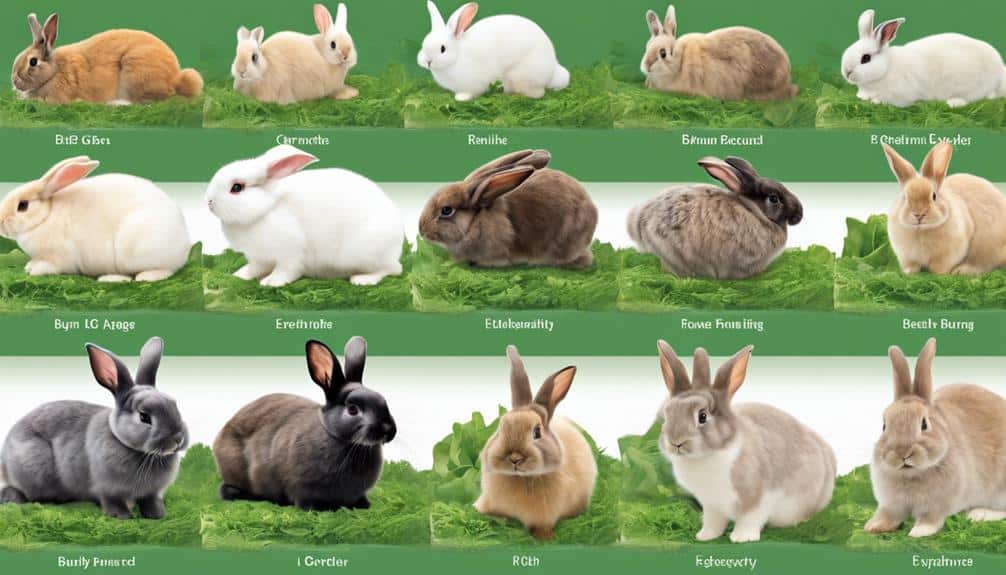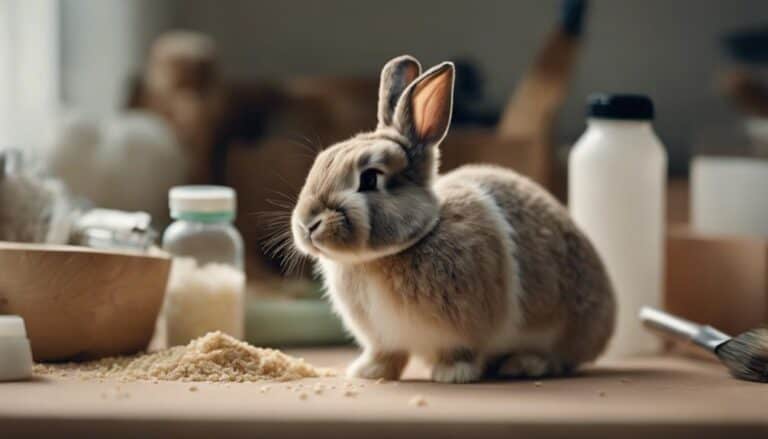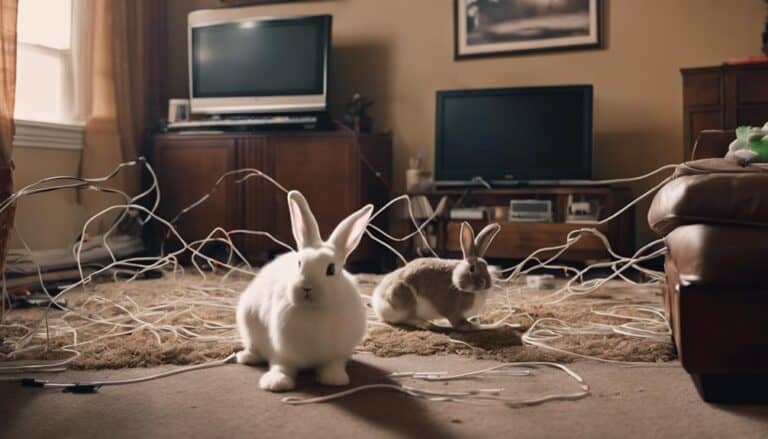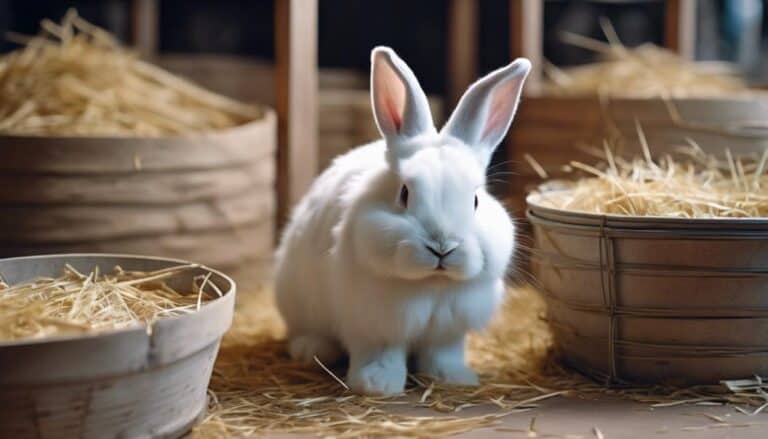Setting out on the adventure of bunny ownership is similar to stepping into a vast garden of care and responsibility. As a new owner, you may find yourself pondering about the ins and outs of providing a loving home for your fluffy companion.
From understanding their behavior to ensuring a balanced diet, these essential FAQs will equip you with the knowledge needed to navigate the world of bunny care. Be prepared to discover valuable insights that will help you nurture a strong and lasting bond with your new furry friend.
Contents
Key Takeaways
- Bunny care basics are crucial for a happy rabbit.
- Litter training and hygiene are essential for a clean environment.
- Regular veterinary care ensures your bunny's health.
- Proper integration and enrichment lead to a happy bunny.
Bunny Characteristics and Behavior

When considering adopting a bunny, it's essential to understand their unique characteristics and behavior to guarantee a successful and fulfilling relationship. Rabbits are social creatures that thrive on companionship, whether it be with their human caregivers or another rabbit friend. They're trainable animals, much like cats and dogs, responding well to positive reinforcement techniques. However, it's important to remember that rabbits are prey animals, which means they can be easily startled and generally dislike being held or restrained. Understanding their sensitive nature is key to building trust and a strong bond.
To guarantee a harmonious living environment, bunny-proofing your home is of utmost importance. Rabbits need a safe space to roam and explore, but they also require supervision to prevent accidents. Meeting their companionship needs and providing ample playtime are essential for their physical and mental well-being. When considering adopting a rabbit, think about their compatibility with other pets you may have and be prepared to invest time in their care to build a loving relationship.
Litter Training Tips and Tricks
When it comes to litter training your bunny, setting up the litter box correctly is key to success. Consistent reinforcement methods, like positive reinforcement and patience, can help your bunny understand where to go.
Be prepared for potential litter box issues, such as territorial marking or stress-related accidents, and address them promptly.
Proper Litter Box Setup
For a successful litter training experience with your new bunny, make sure the litter box is spacious enough to accommodate their size and movements comfortably. Utilize rabbit-safe litter like paper-based or aspen shavings to prevent respiratory issues.
Place hay near the litter box to encourage natural foraging, enhancing your rabbit's experience. Remember to clean the litter box daily to maintain hygiene and prevent odor buildup, ensuring a pleasant environment for both you and your bunny.
Consider having multiple litter boxes in different areas to cater to your rabbit's preferences and needs effectively. By following these tips, you can create a conducive litter training environment that promotes your bunny's well-being and supports their natural instincts.
Consistent Reinforcement Methods
To effectively reinforce good litter training habits in your rabbit, utilize positive reinforcement techniques such as treats and praise when they use the litter box correctly. Remember, consistency is key in training your rabbit.
Here are some tips to help you with litter training:
- Place hay near or in the litter box to encourage proper use.
- Clean accidents promptly to maintain the desired litter box behavior.
- Be patient and consistent in your training efforts.
- Use a gentle tone and positive reinforcement when guiding your rabbit to the litter box.
Potential Litter Box Issues
Addressing common litter box issues is essential for successful rabbit litter training, ensuring a clean and hygienic environment for your furry companion.
When it comes to training techniques, remember that rabbits are naturally inclined to use a litter box, making positive reinforcement key. Avoid unsuitable choices like clumping litter, as it can pose health concerns if ingested. Opt for paper-based or pelleted litters to create a comfortable space for your bunny.
Mistakes to avoid include not cleaning the box regularly or having it in a noisy area. By offering consistency, patience, and multiple litter boxes in different locations, you can help your rabbit adapt successfully to litter training.
Ideal Housing Setup for Bunnies
When setting up a home for your bunny, remember that a spacious cage with a solid floor is key for their comfort and well-being.
Make sure to include essential items like a hide box, toys, water bottles, hay rack, and litter box for a complete bunny habitat setup.
Bunny-proof the space and provide safe bedding for a cozy environment that promotes your pet's health and happiness.
Bunny Housing Essentials
Creating a safe and stimulating environment for your bunny is essential for their well-being and happiness. To guarantee your rabbit's care and habitat setup are excellent, consider the following bunny housing essentials:
- Choose a cage with a solid floor and safe bedding material to maintain hygiene and prevent injury.
- Include essential accessories like a hide box, toys, water bottles, hay rack, and litter box for your bunny's comfort and well-being.
- Regularly clean and maintain the cage to prevent odor buildup and provide a clean living environment.
- Proper habitat setup is vital for your bunny's overall health and happiness, promoting natural behaviors and reducing stress.
Cage Size Requirements
Ensuring your bunny has enough space to move freely and exhibit natural behaviors is crucial for their well-being and happiness.
To meet their needs, you need to provide a cage large enough for them to thrive. For a single rabbit, a minimum of 12 square feet is recommended, while a bonded pair or trio should have at least 24 square feet of space.
It's essential that the cage is tall to allow them to stand on their hind legs comfortably. Providing ample space not only supports physical exercise and prevents health issues related to confinement but also promotes mental stimulation and encourages natural behaviors.
Remember to consult a rabbit-savvy vet for advice on spaying and neutering to further support your bunny's health and well-being.
Play Area Considerations
To provide your bunnies with an ideal housing setup, consider the play area's size and features to guarantee their physical and mental well-being. When setting up a play area for your pet, make sure it meets the following criteria:
- Aim for a play area of at least 4-6 square feet to allow for exercise and hopping.
- Include hiding spots, tunnels, and toys to enrich your bunny's environment.
- Make sure the play area is securely enclosed to prevent escapes and keep your pet safe.
- Provide a soft flooring such as a rug or mat to cushion your bunny's feet during playtime.
Creating a space that combines exercise, enrichment, and safety will contribute to your bunny's overall well-being and happiness.
Nutritional Needs and Diet Recommendations
When caring for a bunny's nutritional needs, prioritize providing fresh hay like Timothy hay as the main component of its diet. Rabbits have sensitive digestive systems, making hay critical for their fiber intake.
Supplement their diet with commercial bunny food, fresh vegetables, and herbs to make sure they receive essential nutrients. While fruits can be given as treats, be cautious due to their high sugar content.
Consulting a vet for specific dietary advice, especially if your rabbit is spayed or neutered, is advisable. Avoid feeding them harmful foods like coconut, chilis, cookies, or chocolate.
Moderation is key when offering pellets, ensuring they're stored correctly to maintain freshness. By carefully selecting and balancing your bunny's diet, you can help promote their overall health and well-being.
Common Health Concerns in Rabbits

What're the most common health concerns you should be aware of when caring for rabbits? When looking after your bunny, it's important to keep an eye out for various health issues that can affect their well-being.
Here are some common health concerns to watch for:
- Dental Problems: Rabbits often face dental problems like overgrown teeth, which require regular trimming to prevent issues such as malocclusion.
- Gastrointestinal Stasis: This serious condition can be caused by factors like an improper diet, stress, or lack of exercise, leading to potentially severe digestive problems.
- Respiratory Infections: Rabbits are susceptible to respiratory infections, especially in damp environments, presenting symptoms like sneezing and nasal discharge that require prompt attention.
- External Parasites: Mites and fleas can bother rabbits, causing skin irritation and hair loss if not treated promptly. Regular checks and proper hygiene can help prevent infestations.
Being vigilant about these health concerns and seeking timely veterinary care when needed can help keep your bunny healthy and happy.
Integrating Your Bunny With Other Pets
When introducing your bunny to other pets, remember to do so gradually and under supervision to minimize stress and prevent potential conflicts. Start by using scent swapping techniques, such as exchanging bedding or toys between pets, to help familiarize them with each other's scent.
Positive reinforcement through treats and praise can also create positive associations between your rabbit and other pets. Providing separate spaces for each pet initially is crucial, allowing them to adjust to each other's presence without direct contact.
If there are concerns about compatibility, seek professional advice from a veterinarian or animal behaviorist. Watch for signs of stress and aggression during the introduction process and be ready to intervene if needed.
With patience and careful monitoring, you can help your bunny and other pets build a harmonious relationship over time.
Frequently Asked Questions
What Do I Need for a First Time Bunny Owner?
For a first time bunny owner, you'll need a spacious cage setup, bunny-safe bedding, hide box, toys, water bottles, hay rack, and litter box. Bond with your bunny through patience, gentle tone, and treats. Assure proper diet, supervision, grooming, and health check-ups.
What Do You Need Before Adopting a Bunny?
Before adopting a bunny, you'll need a spacious cage, hide box, toys, water bottles, hay rack, and litter box for their happiness. A balanced diet of Timothy hay, veggies, and herbs is vital. Guarantee proper care for a rewarding adoption experience.
How Long Does It Take a Bunny to Get Used to a New Owner?
Getting a bunny used to a new owner varies. Factors like age and socialization affect the bonding process. Building trust through patience, setting boundaries, socializing, creating routines, and gentle handling can help your bunny adjust faster.
What to Do When You First Get a Bunny?
When you first get a bunny, focus on creating a safe and comfortable habitat, establishing a nutritious diet, providing enrichment and exercise, grooming regularly, and fostering socialization. Monitor behavior, health, and bond with care.
Conclusion
To sum up, remember that with great bunny love comes great responsibility. As the saying goes, 'An ounce of prevention is worth a pound of cure.'
By staying informed, providing proper care, and showing your bunny love and attention, you can guarantee a happy and healthy life for your furry friend. Remember, bunnies aren't just pets, they're members of the family who deserve the best care possible.






